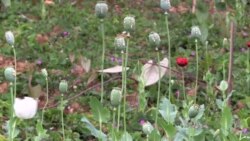For 54-year-old farmer Long San, growing opium makes simple economic sense.
He started planting poppies - which produce the resin that can be manufactured into heroin - eight years ago when the market for his traditional cash-crop collapsed. Like most people in Long Tway village, in the steep hills of Myanmar’s southern Shan State, he used to plant his fields with cheroot leaves, which are used to roll cigars.
“After I switched to opium I could make about $2,500 (3 million kyat) a year,” he said. “With cheroot leaves I was only making $250 (300,000 kyat).”
Despite the windfall, Long San and other farmers in this area interviewed by VOA now say that opium’s inconsistent yields, the soil erosion caused by deforesting the hills to plant poppies, and the threat of government eradication programs mean they are willing to abandon the illicit crop.
Since late last year, the United Nations Office for Drugs and Crime (UNODC) has been recommending coffee as the replacement. They hope the mountainous region’s altitude will lend itself to producing high-quality coffee for export.
Golden Triangle’s shade-grown coffee
Satellite imagery suggests that about 57,600 hectares of Myanmar’s land was planted with poppy last year, producing the largest crop in the world after Afghanistan. Experts say the vast majority of that opium is refined into heroin elsewhere in Shan State and exported to China, where a domestic market for narcotics has boomed along with rising living standards.
Long San said he planted 0.5 hectares of his land with coffee, interspersed with silver oak trees for shade, last year. He said he planned to double that during the current rainy season.
Long San still grows opium on some of his land, but he said he was planning to abandon the crop completely when the coffee - which takes three years to reach maturity - begins to show profit.
“Next year these fields will be all coffee,” he said.
The project is headed by Jochen Wiese, the UNODC’s chief technical advisor for alternative development in Myanmar. The German national spent 28 years developing similar schemes in South America, and has come out of retirement to take on Myanmar’s poppy problem.
Wiese said that the approach of the project was to focus on small areas in an attempt to wrest communities from the “distorting” economics of opium poppies. The UNODC is starting small, with just 450 farmers across a handful of villages planting half a hectare each of coffee and silver oak.
“We have to demonstrate to people that through income this will be a success, we can’t go to a hundred different sites, we have to work in a very concentrated way,” he said, adding that the farmers were “very enthusiastic” about the project,
“Everybody wants to have another half hectare,” he said, predicting that 600 hectares of coffee will be planted by the end of this year. “This is a very good indicator of the interest and the real will of the people to change.”
Opium profits drive Shan State fighting
The U.N. provides coffee seeds and fertilizer and gives other assistance to the farmers. It is also helping farmers to set up cooperatives to overcome the economies of scale required to export coffee beans to international markets.
But with the Chinese market’s enormous demand for heroin, the situation in Shan State is further complicated by the lack of peace in the hills. Armed ethnic groups and the Myanmar government vie for territorial control. Despite a cease-fire agreement between the government and the biggest local group, the Shan State Army-South, small skirmishes frequently break out.
The U.N. estimates Myanmar's opium crop for the past two years combined could be worth $880 million, and Tom Kramer, a researcher with the Netherlands’-based Transnational Institute’s drugs and democracy project, said that groups on all sides of the conflict rely on the drug trade's profits.
“Very few of the conflict actors in Shan State, including the Myanmar army, can claim to have clean hands when it comes to the drug trade. That’s the reality,” he said.
“They are involved in different ways, for some it’s just tax, some maybe involved in production, some are involved to some extent in trafficking.”
Kramer said that the Myanmar government’s eradication efforts were a blunt tool with which to tackle opium production.
“There’s is no evidence anywhere that eradication reduces opium production,” he said, explaining that in Afghanistan, for example, farmers facing the threat of the government clearing some of their fields would simply plant more poppy as insurance.
Another farmer involved in the U.N. program, Sai San Oo, 48, said that in past years, some of his fields had been cleared by the government. He was forced to work as a day laborer to make up for the lost income, but returned to growing poppy the following year. Now, however, he says he want to switch all his fields to coffee.
“I have... high hopes that this will benefit my living standards,” he said. “[I] believe that there is an international market for this, so I’m happy to be planting coffee.”
In Myanmar, Some Farmers Drop Poppies for Coffee Beans
TAUNGGYI, MYANMAR —









